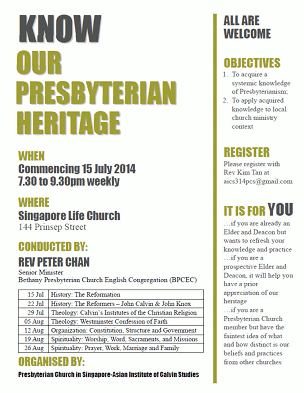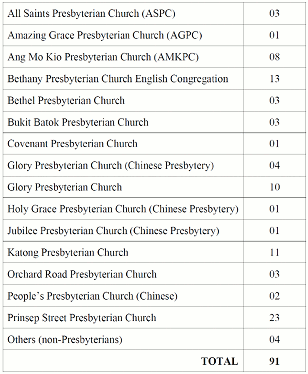 |
||
|
|
|
Events & News Archive
|
Know Your Presbyterian Heritage
The Asian Institute of Calvin Studies was set up as a Synod initiative at the 40th Session of the Synod Annual General Meeting in March 2014. It is set up with the twofold aims of training and research in the aspects of John Calvin’s theology – e.g., history, theology, homiletics and pastoral. One of the training objective is to strengthen our Presbyterian heritage (identity, theology and practice). So, in the end-March meeting of the AICS Task Force, it was decided that we should run a course to help members of Synod member churches to have an appreciation of our Presbyterian heritage. There should be two courses run parallel in Chinese and English, with the former to be taught by Rev. Tan Tiong Ann and the latter by my good self. Rev. Tan Tiong Ann taught the course in Mandarin in May and June 2014. However, I was only available to teach the course in July 2014. It was decided that the English course would commence on 15 July 2014, on Tuesday evenings and over seven sessions. So the publicity for the course in English was sent out in mid-June. At the launch of the publicity, we had yet to settle the venue for the course. We were thankful to the leadership of Singapore Life Church for opening up the Multipurpose Hall 1 (Level 5) for us. The office staffs and caretaker had provided the administrative and logistical support generously.
Although I had taught the Presbyterianism course at Trinity Theological College (TTC) for three times, I must confess that teaching this course had been a challenge for me personally. In the previous courses, it was intended for TTC undergrads and preachers who were doing it as a denominational studies elective and licensing requirement respectively. But this "Know Your Presbyterian Heritage" course was intended for everyone – pastors, preachers, elders, deacons, and members. Bearing in mind it had to be run at a popular level, easily understood and relevant to "ordinary" Presbyterian members, I had to provide more detailed notes and hand-outs. Previously, I had to provide "scanty" notes and the rest were filled up by students’ participation through class presentations and discussions. I also had to re-read some of my previous sources and also found some new resources to teach the class. I had to talk more than the previous courses, providing stories and anecdotes along the way to engage them. After all, most of them came after a long day at work and it was a challenge to engage them for two hours on a subject as such was no easy task. To compound the challenge, it was a series over seven weeks. I was very encouraged by the vast majority who were there almost ninety percent of the lessons. I am very grateful for the kind and encouraging feedback from many of the attendees. Here are some of the responses I received from the attendees throughout the course. "Appreciate you for the lesson & clear presentation. (History was a nightmare in secondary school days." (Mr Andrew Leong, PSPC) "It was an enlightening lecture. Looking forward for the rest of the lessons. Thanks for the sharing." (Dn Desmond Yeo, GPC) "Enjoyed the session and definitely learnt a lot. PTL!" (Dn David Low, Glory Presbyterian Church) "Thanks for your sessions. Really insightful." (Eld John Ang, BBPC) "I thank GOD that enable my wife, me to learn from you through your sharing and teaching throughout these four lesions." (Mr Chew Wing Kee, PSPC) "Thanks, Peter for the well-prepared and presentation of the lessons. Praise and thank God for your availability." (Eld Alvin Ooi, ORPC) "Just wanted to thank you for the talks. Though I missed 3 of them they were so insightful n rich." (Dr Collin Koh, PSPC) "The classes have been very informative and helpful to me. Really appreciate your teachings." (Mr Shawn Eng, ASPC) "The seminar has been an eye-opener for me. The subject matter dealt in-depth reflects very deeply on the extensive research carried out in preparation of your talks. I have benefitted through both attending the talks and reading the hand-out notes which also enable me to research further on my own. Never did I realise the Lutheran reformative years in the beginning had been so full of rich heritage timeline leading to the Presbyterian Church movement today. Thank you very much for giving us the opportunity to learn about the Presbyterian heritage." (Mr Simon Sim, PSPC) "Thanks for conducting the class. i found it very enriching indeed, especially the later lectures. The connection between our Presbyterian doctrine and application to our perspective in life is very seldom preached. One suggestion is if you can have notes rather than PowerPoint slides, it will be better. The slides can only contain so much, and if the text is too much, it becomes very small. But, thanks for taking the time to do this." (Mr Andrew Goh, GPC) "Thank you once again for your talks over the last 7 weeks. I really looked forward to each session and I found the pastoral aspects quite interesting. I tend to favour adult baptism but I found your arguments for infant baptism very persuasive. Your passion for church history, not so much as an academic pursuit but how it speaks to us today, really shows." (Dr Koh Tse Yuen, PSPC) "Thank you for your generosity in sharing your vast knowledge and experience with us. I totally enjoyed the sessions at both the Dismiss the Crowd and also the Presbyterianism course. I thank God for blessing you with the gift of teaching as you continually engage your participants and inspire us to search ourselves and go make disciples. Thank you for blessing me." (Mrs Katherine Goh-Tan, KPC) Besides these very encouraging feedback, a couple of ideas for improvement were received. For example, whether we could extend the number of sessions to allow more time for interaction and discussion. I agree that running over more sessions would allow time for interaction and discussion, but my fear is that much lesser people would be willing to sign up and turn up for the class. I sought to overcome this shortcoming by providing more detailed hand-outs. Another feedback for improvement received was to have notes rather than PowerPoint hand-outs. Perhaps we should not save on printing costs by printing two PPT slides per page, which would mean better visibility for reading. Of course, it would also mean running more pages for the hand-outs. I was very encouraged when one of the pastors our EP churches informed me that there were eight people from the EDC attended the course. Also, he informed me that they discussed and decided to put into practice some of the things they heard and learned from the class. Going forward, we do have licensing process to ensure consistency of standards of our Preachers and Ministers, but we have yet to have any denominational level Church Officers training for our Elders and Deacons to ensure consistency of standards – e.g. biblical literacy and appreciation of our Presbyterian heritage. Is there something we should put in place in our denominational organisational structure for the training of church leaders? As mentioned at the beginning and end of the course, I am not involved in teaching Presbyterianism to produce "did-hard" Presbyterians. After all, the motto of the Reformed tradition is that "The Church Reformed is Always Reforming!" Every generation of believers tend to think of themselves being wiser and cleverer than the previous generation. This attitude is true of society at large as well; but it is very true in contemporary urban church. So, to safeguard the raising of the ugly heads of human hubris, before we start dismantling and disregarding any of our Presbyterian traditions, we must bear in mind the African proverb: "Before we bring down the fence, we must first ask why it was put up in the first place." If we have not answered the "why", we should attempt to do the "what"! Otherwise, we may end up as idolatrous people, worshipping the god called "relevancy", instead of the God of biblical revelation!
Soli Deo Gloria!
|
|
|
Copyright © 2024 The Presbyterian Church in Singapore. All rights reserved. |

 At the commencement of the course, there were sixty-seven people signed up for the course. But with each passing week, we see more people coming and by the end of the course we had a final figure of ninety-one people officially registered. There were few people who didn’t leave their names with us when they turned up for the sessions and so we didn’t include them in the statistics. We are grateful for the enthusiastic response from almost all EP churches. We had also a few attendees from CP churches. The distribution of participants from our EP Churches are shown in the table here.
At the commencement of the course, there were sixty-seven people signed up for the course. But with each passing week, we see more people coming and by the end of the course we had a final figure of ninety-one people officially registered. There were few people who didn’t leave their names with us when they turned up for the sessions and so we didn’t include them in the statistics. We are grateful for the enthusiastic response from almost all EP churches. We had also a few attendees from CP churches. The distribution of participants from our EP Churches are shown in the table here.